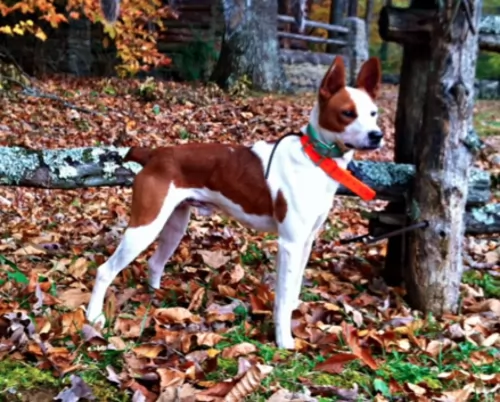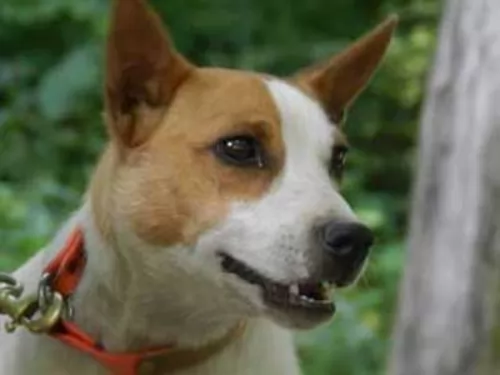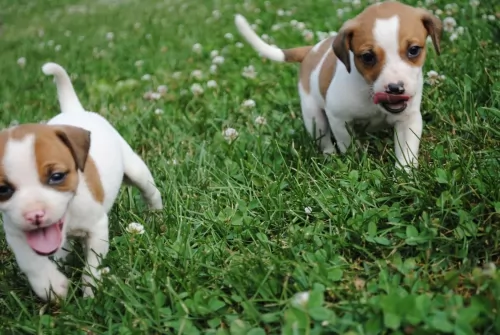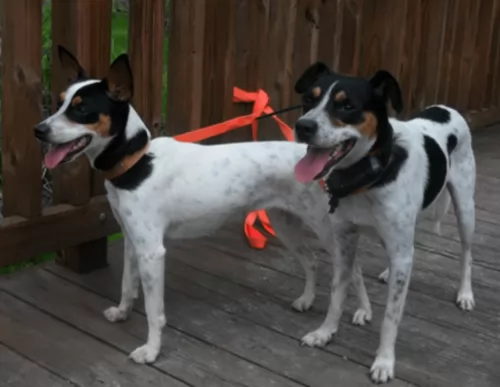 Petzlover
Petzlover Mountain Feist is originated from United States but Red Heeler is originated from Australia. Both Mountain Feist and Red Heeler are having almost same height. Mountain Feist may weigh 38 kg / 84 pounds more than Red Heeler. Mountain Feist may live 3 years more than Red Heeler. Both Mountain Feist and Red Heeler has same litter size. Both Mountain Feist and Red Heeler requires Low Maintenance.
Mountain Feist is originated from United States but Red Heeler is originated from Australia. Both Mountain Feist and Red Heeler are having almost same height. Mountain Feist may weigh 38 kg / 84 pounds more than Red Heeler. Mountain Feist may live 3 years more than Red Heeler. Both Mountain Feist and Red Heeler has same litter size. Both Mountain Feist and Red Heeler requires Low Maintenance.
 In the Southern portion of North America, the Mountain Feist was developed. It is the Ozarks and Southern Appalachia that the Mountain Fiest calls his ancestral home. The breed dates back centuries and looks very much like a Jack Russell or rat terrier. George Washington, Abraham Lincoln and William Faulkner all featured the breed in their writings. For Washington it was his diary, Lincoln the poem “The Bear Hunt” and Faulkner “Go Down Moses”. These dogs, much like the Curs, were an important part of the early pioneer days in America.
In the Southern portion of North America, the Mountain Feist was developed. It is the Ozarks and Southern Appalachia that the Mountain Fiest calls his ancestral home. The breed dates back centuries and looks very much like a Jack Russell or rat terrier. George Washington, Abraham Lincoln and William Faulkner all featured the breed in their writings. For Washington it was his diary, Lincoln the poem “The Bear Hunt” and Faulkner “Go Down Moses”. These dogs, much like the Curs, were an important part of the early pioneer days in America.
The name Feist means a noisy, small dog in ancient languages. The Feist was developed in the South, the rural areas, in order to hunt and eliminate vermin and small prey animals. The breed was originally a cross between British terriers and hounds from Native Americans. Many others think the feist is not a breed but a type, a working dog which can vary individual to individual.
The Mountain Feist of today has been bred for hunting performance over generations of time. They hunt racoons, squirrel and rabbits among others. They can track even larger game. Other varieties of the feist include the Bench Legged Feist and the Pencil-tail Feist. This is an energetic working dog, curious, intelligent and alert. It is a loud, barky dog that needs to learn a “no bark” command or it may drive you crazy. The breed make good hunting dogs, watch dogs and companions.
The breed was recognized by the United Kennel Club (UKC) in 2015, but not by the AKC or American Kennel Club. Other breed organizations include the National Cur & Feist Breeder’s Association, The National Feist Breeder’s Association, The American Treeing Feist Association, and the Shadowtails Outdoors Group.
 Known also as the Australian Cattle Dog, the Red Heeler is also known as the Blue Heeler. This is a breed of herding dog originally developed in Australia.
Known also as the Australian Cattle Dog, the Red Heeler is also known as the Blue Heeler. This is a breed of herding dog originally developed in Australia.
These dogs are known for their stamina and resilience with driving cattle over long distances in hot weather and across rough terrain.
It was George Eliott who developed the Red Heeler – crossing native Dingoes with Collies and other herding dogs.
In America, the breed was fully recognised in September 1980.
 The Mountain Feist is a medium sized dog with pointy ears that are long and fold over. With their sharp nails that are curved they can climb. Their hind legs are strong to support that activity as well. They have small, dark eyes, a black nose and a muzzle that is medium length and a round skull. The neck is strong, and they have a pretty deep chest. The Mountain Feist tail is bushy, high and erect. There coats come in a variety of colors including blue, black, white, red and brown with the brown being the most common.
The Mountain Feist is a medium sized dog with pointy ears that are long and fold over. With their sharp nails that are curved they can climb. Their hind legs are strong to support that activity as well. They have small, dark eyes, a black nose and a muzzle that is medium length and a round skull. The neck is strong, and they have a pretty deep chest. The Mountain Feist tail is bushy, high and erect. There coats come in a variety of colors including blue, black, white, red and brown with the brown being the most common.
There is a lot of variation of make up and type within the breed itself. Until the last decade or so the breed was fairly isolated among squirrel hunters and there was little cross breeding with other dogs. On the other hand, dogs in the regions where the Mountain Feist was isolated were crossed with them to give them the tree climbing ability, change their size, sharpen their senses or one particular sense and change their appearance.
This is why in different regions you will find Mountain Feist with attributes of the Curs, or the Elkhounds, the Terriers, Spitz or Coonhounds. This accounts for the various types of Mountain Feist Dogs.
 The Red Heeler is a medium-sized dog standing at between 43 to 51 cm in height and weighing in the region of 14 – 16 kg.
The Red Heeler is a medium-sized dog standing at between 43 to 51 cm in height and weighing in the region of 14 – 16 kg.
He is muscular, with a sturdy build. The coat of this robust dog is shortish and thick and quite often you’ll find a white star marking on he forehead. The coat is a blue-grey color or reddish. The tail of this dog is long and the ears are erect.
The Red Heeler has always been a working dog so he is energetic and lively, being independent and strong-willed.
He is super intelligent too and can be easily trained and socialized. He is a dog that simply loves the outdoors and if you don’t live on a farm, he is going to need lots of exercise.
He gets on well with kids and other pets, but children should be taught to respect him and be kind towards him, otherwise he might not tolerate them. He is a loyal, protective dog, wanting to ensure the safety of his human family.
 Yes, they very much enjoy playing with children.
Yes, they very much enjoy playing with children.
Tree climbing and stamina.
They need space and land on which to run every day. If you are in an apartment, make sure you have access to a dog park.
They are very intelligent and learn quickly. They love to please but can also be stubborn.
 When you bring a Red Heeler into your home, you must know that you’re never going to have a dull moment. They’re not content to lie around with nothing to do. These popular dogs literally coax you to come out and to be active.
When you bring a Red Heeler into your home, you must know that you’re never going to have a dull moment. They’re not content to lie around with nothing to do. These popular dogs literally coax you to come out and to be active.
Red Heelers need lots of activities and lots of room, so they aren’t particularly suited to life in the city. Large properties and plenty to do is what they ask for.
Your Red Heeler is going to make a splendid pet, loyal and devoted, the perfect example of man’s best friend.
 Like most breeds that are isolated, the Mountain Feist does not have a lot of known genetic health issues. They are generally healthy and known to live as many as eighteen years. Perhaps the biggest threat to their lives is the hunting accident, harming joints or paws in hunting situations or being attacked by a larger animal. There are no real genetic threat. Of course, with any dog that has folded ears there is always the possibility of infection or allergies. Keep their ears clean. The other possible concern is hip dysplasia in such an active dog. This can lead to lameness or arthritis. Obesity is another concern that could also lead to hip dysplasia.
Like most breeds that are isolated, the Mountain Feist does not have a lot of known genetic health issues. They are generally healthy and known to live as many as eighteen years. Perhaps the biggest threat to their lives is the hunting accident, harming joints or paws in hunting situations or being attacked by a larger animal. There are no real genetic threat. Of course, with any dog that has folded ears there is always the possibility of infection or allergies. Keep their ears clean. The other possible concern is hip dysplasia in such an active dog. This can lead to lameness or arthritis. Obesity is another concern that could also lead to hip dysplasia.
 Your Red Heeler can live to be 15 years of age with good care. Every dog however, can fall prey to some of the many common dog diseases there are, some of which can be -
Your Red Heeler can live to be 15 years of age with good care. Every dog however, can fall prey to some of the many common dog diseases there are, some of which can be -
There are quite a lot of congenital and inherited musculoskeletal disorders in dogs, with some of the more common ones being hip dysplasia and muscular dystrophy for instance.
There are some of these musculosceletal problems which can be fatal. Some of the typical symptoms you’ll see with these problems are difficulty climbing stairs or jumping, loss of muscle mass in the hind limbs, arthritis and lameness.
The retina of the eye is that light-sensitive part and which is part of the central nervous system. With retinal degeneration, the cells decline, leading to impaired vision and sometimes even blindness.
Some symptoms to look out for include dilated pupils, night blindness and the inability to see clearly in bright light. The disease worsens over times with sudden blindness being quite common with older dogs. Your vet will want a thorough history of your dog’s health.
Other dog diseases to be very aware of are cancer, obesity, bloat, hip dysplasia and epilepsy.
 These are very active pups who need a high protein, high quality dry food. Feed a cup to a cup and half broken down into three meals daily. Do not overfeed your puppy.
These are very active pups who need a high protein, high quality dry food. Feed a cup to a cup and half broken down into three meals daily. Do not overfeed your puppy.
Feed the adult about two cups a day broken into two meals. Again, you are looking for a high quality, high protein dry food. Do not overfeed and watch for obesity.
This is a very active breed – a hunting dog with a lot of stamina, strength and energy. They need plenty of exercise as the terrier side of them is just a little hyper. They need at least two walks per day, and they are not great apartment dogs. They need both mental and physical stimulation. This little dog can keep going at a good rate for a long time.
 The Red Heeler is an active dog, and apart from walks which will give him the chance to sniff around, he will need lots of other forms of exercise. Rope pulling games he’ll love and running after a ball will please him because it takes him back to days when he used to run around and herd livestock.
The Red Heeler is an active dog, and apart from walks which will give him the chance to sniff around, he will need lots of other forms of exercise. Rope pulling games he’ll love and running after a ball will please him because it takes him back to days when he used to run around and herd livestock.
If you’re an outdoorsy type of person who loves hiking in the wilds and swimming in rivers, you can count this dog in.
You can look at the Red Heeler as a low maintenance dog. He does shed, but a good brush of the coat twice a week will be excellent for him. If he doesn’t wear his nails down naturally, you will need to trim them. Also, while you are brushing him, check his ears and eyes and inside his mouth to make sure he is clear of all infections.
Red Heelers rely on good food for their resilience and stamina, and for convenience it is good to have commercially manufactured dog food as a backup. The best is home-made food which is easy to prepare and totally uncomplicated.
Simply add into one big pot chicken, brown rice or pasta and spinach, sweet potatoes and carrots. This food can all be chopped up, refrigerated and added warmed up and in small portions to your pet's dry kibble once or twice a week. Simple and tasty, your Red Heeler will love it and thrive on it too.
Ensure there is always a bowl of fresh, cool water within his reach.